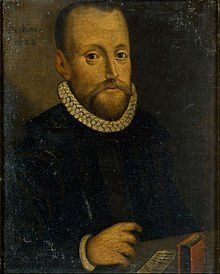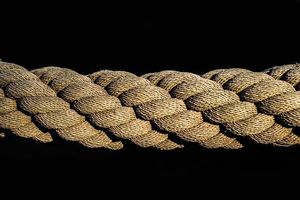Picture the scene. On a tall, wooden scaffold stands a man dressed in rags and with his hands bound. His dark eyes are full of horror as he flinches before the jeering crowd, many of whom have brought rotten eggs and fruit to throw at him.
The hangman’s noose is set round his neck and he is brought to stand over the trap door. Chilling cries arise from a few among the teaming crowd. ‘Die, thou man of death!’ ‘Filthy villain!’ ‘To hell with thee!’
But as the hangman’s hand is raised, and the people hold their breath for the final execution, a piercing voice of authority ascends over the top the crowd. ‘Halt forthwith!’
Worse than death
A stout Puritan minister, with stiff white collar and Geneva Bible clutched under his arm, appears at the base of the scaffold. Awkwardly but quickly he climbs the ladder, one of his hands being malformed, and steps onto the platform in front of the doomed criminal.
The wretched convict already appears to be in agony of mind. The Puritan minister demands: ‘What is the matter with thee? Art thou afraid of death?’
The prisoner denies it, shaking his head, and says he is afraid of something far worse. ‘Sayest thou so?’ asks the minister. ‘Come down again man, and thou shalt see what God’s grace will do to strengthen thee’.

So, with the hangman’s consent, the minister takes him back down the ladder and makes him kneel with him at the foot of the scaffold.
According to the Puritan biographer Samuel Clarke, ‘that blessed man of God made such an effectual prayer in confession of his sins … with the horrible and eternal punishment due to the same by God’s justice, as made the poor prisoner burst out into abundance of tears’.
Hand of mercy
Clarke continues: ‘Finding that [the minister] had brought him low enough, even to hell gates, he proceeded to the second part of his prayer, and therein to show him the Lord Jesus (the Saviour of all penitent and believing sinners) stretching forth his blessed hand of mercy and power to save him in that distressed estate, and to deliver him from all the powers of darkness.
‘Which he did so sweetly press with such heavenly art and powerful words of grace upon the soul of the poor prisoner, as cheered him up again to look beyond death, with the eyes of faith, to see how the black lines of all his sins were crossed and cancelled with the red lines of his crucified Saviour’s precious blood.
‘So graciously [did the minister apply the gospel] to his wounded conscience, as made him break out into new showers of tears for joy of the inward consolation which he found, and gave such expression of it to the beholders, as made them lift up their hands, and praise God to see such a blessed change in him;
‘Who (the prayer being ended) rose from his knees cheerfully, and went up the ladder again so comforted, and took his death with such patience and alacrity, as if he actually saw himself delivered from the hell which he feared before, and heaven opened for the receiving of his soul, to the great rejoicing of the beholders’ (Clarke, Marrow of Ecclesiastical History, 1654, pp. 852-53).
Crossed swords
This was one day in the life of Master William Perkins, an outstanding Puritan divine of late sixteenth-century Cambridge. His preaching every Lord’s Day at the local jail was blessed to the conversion of many prisoners, Perkins ‘being moved with pity towards their souls’ (Clarke, p.851).
But surely such a zealous and evangelistic preacher was an Arminian? Surely his conviction that the most unlikely sinners could be saved, must have been borne of a belief in the innate goodness of man and human free will?
At the very most, Perkins would have been an exceedingly moderate Calvinist, who would say little about predestination and would quietly withhold such things from the people? For belief in predestination is incompatible with such a concern for souls and such an attitude of expectancy — right?
Wrong! Perkins was a strict Calvinist and a renowned champion of a full-orbed Reformed orthodoxy. In fact it was Perkins who crossed swords most fiercely with Jacobus Arminius himself, in a series of rival publications and international debates.
Unambiguous
Perkins abhorred Arminianism for, in his view, it made Christ only a ‘half redeemer’ (Perkins, Works, 1616-18, II:622). Perkins was consumed with a desire for the glory of God in salvation, and clearly taught to a Christocentric, ‘double-predestinarian’ scheme.

The latter term refers to the teaching that God predestines the non-elect to hell as truly as he predestines the elect to heaven. Perkins argued from Romans 9:21 that everyone ‘is unto God, as a lump of clay in the potter’s hand: and therefore God according to his supreme authority doth make vessels of wrath, he doth not find them made’ (II:610; emphasis added).
For Perkins, redemption was unambiguously ‘particular’. Concerning the substitutionary death of Christ, he taught that ‘the price is appointed and limited to the elect alone by the Father’s decree, and the Son’s intercession and oblation’.
Christ (he continues) ‘doth not sacrifice for those for whom he doth not pray: because to make intercession and to sacrifice are conjoined: but he prayeth only for the elect’ (II:609).
Perkins did not shy away from stating bluntly of the reprobate that God ‘giveth them no Saviour. For Christ is only the Redeemer of the Elect, and of no more’ (I:415).
Distinctives
Nor did Perkins feel it necessary to soften his Reformed distinctives in the realm of preaching the gospel to sinners.
He taught that ‘ministers of the gospel ought indifferently to exhort all and every one to repent’ (II:608). But he did not resort to the kind of equivocal language which suggests that God somehow desires to save those whom he had already foreordained to destruction. Such an approach, Perkins believed, could lead only to Arminianism.
According to Perkins, God does not desire to save the reprobate, nor does God suffer frustration or conflict of will concerning them. Yet this does not render the gospel call insincere, ‘for by this means’, declares Perkins, ‘he shows unto them the riches of his grace, and declares that they perish by their own fault’ (II:625).
But if God would have all men to be saved, he asks, then why are they not all saved? The answer would have to be that ‘men will not keep the condition [accept God’s terms] and believe’. But that, he protests, ‘is flat to hang God’s will upon man’s will; to make every man an emperor, and God his underling’ (I:295).
Rather, he continues, ‘God sometimes giveth a commandment [to repent and believe] not that it should be actually done, but that men may be tried, and that they may be convicted of their natural infidelity before God in the last judgement’ (II:625).

Standard fare
This theology was not closet Calvinism, confined to the ivory towers of Cambridge colleges. True enough, Perkins moved in academic circles throughout his working life. Born in Warwickshire in 1558, Perkins entered Christ’s College, Cambridge, in 1577.
Having been made Fellow in 1584, he took up the only other position of his career in 1595, namely, lecturer at St Andrew the Great, Cambridge, a post he held until his death on 22 October 1602, exactly 400 years ago.
Yet Perkins’ theology was standard and popular fare in Elizabethan England. Between 1590 and 1618 the primary publishing house in Cambridge printed approximately 210 books. Of these Perkins wrote no fewer than fifty.
These books comprised not only weighty Latin tomes for the benefit of European scholars, but also plain English devotional volumes suited to the spiritual needs of the simplest believer.
Modern scholars today concur in styling Perkins as the most eminent English Reformed theologian of the late sixteenth century. But Perkins was also formative in promoting a deeply experiential and practical Calvinism, which was characterised as much by a compassion for souls as a zeal for correct doctrine.
At the four-hundredth anniversary of this great man’s death, we would do well to reconsider the life and teaching of this father of Puritanism. Let us pray that God in his mercy would raise up in our day what Perkins was in his — soul-winning champions of orthodoxy









